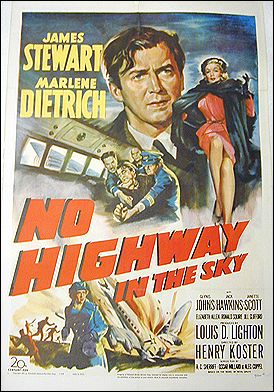
NO HIGHWAY IN THE SKY
UK. 1951, 98 minutes, Black and white.
James Stewart, Marlene Dietrich, Glynis Johns, Jack Hawkins, Janette Scott, Elizabeth Allan, Ronald Squire, Jill Clifford, Felix Aylmer, Dora Bryan, Maurice Denham, Wilfrid Hyde- White, Niall Mac Ginnis, Kenneth More.
Directed by Henry Koster.
No Highway in the Sky is based on a novel by Neville Shute (A Town Like Alice, On the Beach). It was adapted for the screen by playwright R.C. Sheriff (Journey’s End).
The film is interesting in retrospect, after more than half a century of plane disasters. It is a film about aeronautics and about scientists.
James Stewart portrays Theodore Honey, an aeronautical engineer who has been examining metal stress in planes. His theory is that aircraft design could raise problems with structural failure, especially of the vertical tale, from metal fatigue. This was new at the end of the 1940s. A plan crashes and Stewart goes to investigate. He fails to realise (a bit of an absentminded boffin) that the plane he boards is one of those who experiences the stress that he is considering.
The drama is on the plane itself with the engineer trying to persuade crew that they are in danger. Glynis Johns is one of the flight attendants. Marlene Dietrich gives strong support as a film star who happens to be travelling on the plane. A substantial British cast is in support led by Jack Hawkins.
The film preceded the disaster films by almost twenty years. However, it creates tension especially with audience identifying with a more ordinary kind of situation, characters.
James Stewart is, as always, pleasantly laidback even when he is concerned about a crisis.
The film was directed by Henry Koster, the Berlin-born director who made a number of films in Germany but left in the mid-30s to go to Hollywood, making a number of films with Deanna Durbin, 100 Men and a Girl, as well as a number of pleasant comedies during the 1940s (The Bishop’s Wife, Come to the Stable, The Inspector General). At this period he worked at 20th Century Fox with some standard films including Harvey with James Stewart. With the coming of Cinemascope, he directed the first Cinemascope film, The Robe as well as Desiree, A Man Called Peter, The Virgin Queen, Good Morning Miss Dove and D -Day the 6th of June. During the 1960s he teamed up again with James Stewart for a number of domestic comedies, Mr Hobbs Takes a Vacation, Take Her, She’s Mine, Dear Bridget.
1. Enjoyment, the impact of the film in 1950? Now? Changes in audience response? In technology, science and disasters?
2. Black and white photography, music? The stars and their impact? The melodramatic background? The pace of the film?
3. The significance of the title? Reference to aviation? The irrevocable nature of people flying and courting disaster?
4. The initial atmosphere of Farnborough, entering into the film with Scott? Interest in aviation, experimentation? How authentic did this seem?
5. The focus on Boffins and the use of the word? The film's comment on Boffins and their contribution in theory to progress?
6. James Stewart's style as Mr Honey? His skill in his work, as a Boffin? His involvement with the experiments? His hesitant manner, his absent-mindedness? The atmosphere of unreality about him? Yet his genial personality? His work, Scott's visit, a trip home and his absent-mindedness at home? His love for Elspeth? The family situation and Elspeth looking after her father? His intellectualizing her upbringing?
7. The background of the Labrador situation and the crash? The investigation and the need for research? The reactions of the authorities, their reaction to Mr Honey?
8. The melodrama of the flight? Honey's reaction, causing anxiety? Marjorie an a competent hostess, meeting Mr Honey, learning who he was and trying to cope with him? Monica Teandal and Marlene Dietrich's style, her listening to Mr Honey then taking him seriously? The reaction of the crew and their decisions?
9. How did these experiences humanize Honey? How did they help him to see a wider view of reality?
10. The tension and the landing at Gander? The reaction of the crew, information from London, Marjorie and supervision of Mr Honey, his impulsive reaction with the lover? World reaction to his behaviour?
11. The sequences of investigation: how interesting, what points did they raise? Mr Honey's resignation?
12. The focus on Monica and the human touch to the situation? The effect of the experience on her? Her visiting Elspeth, friendship with Marge?
13. Marge as an ordinary young woman, caring for Elspeth, caring for Mr Honey? Her help in the house? A future with Mr Honey?
14. The contrasts of Honey's attitudes with those of his daughter? Her becoming too scientific and mathematical? Her need for ordinary humanity?
15. The build-up to Honey's vindicating his theories? The tension of the tent? The failure?
16. The importance of the vindication sequence? The plausibility of the temperature factor?
17. What did the film have to way about scientists, science and mathematics, engineering and aviation? The role of experts and their influence? The disaster style of the fifties compared with later styles? Which was better?